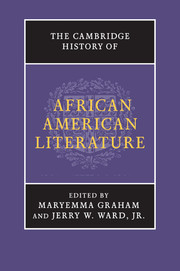Book contents
- Frontmatter
- Introduction
- PART I AFRICAN AMERICAN LITERATURE FROM ITS ORIGINS TO THE TWENTIETH CENTURY
- 1 Sounds of a tradition: the souls of black folk
- 2 Early print literature of Africans in America
- 3 The emergence of an African American literary canon, 1760–1820
- 4 Dividing a nation, uniting a people: African American literature and the abolitionist movement
- 5 African American literature and the abolitionist movement, 1845 to the Civil War
- 6 Writing freedom: race, religion, and revolution, 1820–1840
- 7 “We wish to Plead our own Cause”: independent antebellum African American literature, 1840–1865
- 8 Racial ideologies in theory and practice: political and cultural nationalism, 1865–1910
- 9 The “fictions” of race
- 10 “We Wear the Mask”: the making of a poet
- 11 Toward a modernist poetics
- PART II AFRICAN AMERICAN LITERATURE IN THE TWENTIETH CENTURY
- PART III AFRICAN AMERICAN LITERATURE AS ACADEMIC AND CULTURAL CAPITAL
- Bibliography
- Index
- References
6 - Writing freedom: race, religion, and revolution, 1820–1840
from PART I - AFRICAN AMERICAN LITERATURE FROM ITS ORIGINS TO THE TWENTIETH CENTURY
Published online by Cambridge University Press: 28 May 2011
- Frontmatter
- Introduction
- PART I AFRICAN AMERICAN LITERATURE FROM ITS ORIGINS TO THE TWENTIETH CENTURY
- 1 Sounds of a tradition: the souls of black folk
- 2 Early print literature of Africans in America
- 3 The emergence of an African American literary canon, 1760–1820
- 4 Dividing a nation, uniting a people: African American literature and the abolitionist movement
- 5 African American literature and the abolitionist movement, 1845 to the Civil War
- 6 Writing freedom: race, religion, and revolution, 1820–1840
- 7 “We wish to Plead our own Cause”: independent antebellum African American literature, 1840–1865
- 8 Racial ideologies in theory and practice: political and cultural nationalism, 1865–1910
- 9 The “fictions” of race
- 10 “We Wear the Mask”: the making of a poet
- 11 Toward a modernist poetics
- PART II AFRICAN AMERICAN LITERATURE IN THE TWENTIETH CENTURY
- PART III AFRICAN AMERICAN LITERATURE AS ACADEMIC AND CULTURAL CAPITAL
- Bibliography
- Index
- References
Summary
In a letter to Maria Stewart about one of her essays in The Liberator, William Lloyd Garrison praises her argument “pertaining to the condition of that class with which you were complexionally identified.” Although his intent was only to compliment the work of Stewart, he also identified one of the central conundrums for free blacks in the antebellum period: that of being free, yet slave-classed. “We wish to plead our own cause,” the motto for Freedom's Journal, the country's first black newspaper, speaks to both the independence of antebellum black activists and thinkers and the ways in which literature produced for and by free blacks before 1865 could never be entirely independent of slavery and abolitionism. The phrase itself, “wish to plead,” emphasized a desire to address one's status as free and black in America while making a case for giving voice in an environment that would deny the voices of all blacks, free or enslaved. Inevitably, in the American cultural imagination, African Americans were a monolithic group, all slave-classed. In this way, free blacks and enslaved blacks were inextricably intertwined.
Thus, the literature produced by free blacks of the nineteenth century, whether or not its subject was slavery, could not escape the context of enslavement. Slave ships, auction blocks, fugitives, and insurrections all served as an omnipresent backdrop. Consequently, black writers of the antebellum period produced a particular kind of literature that walked a political tightrope.
- Type
- Chapter
- Information
- The Cambridge History of African American Literature , pp. 116 - 133Publisher: Cambridge University PressPrint publication year: 2011
References
- 1
- Cited by

